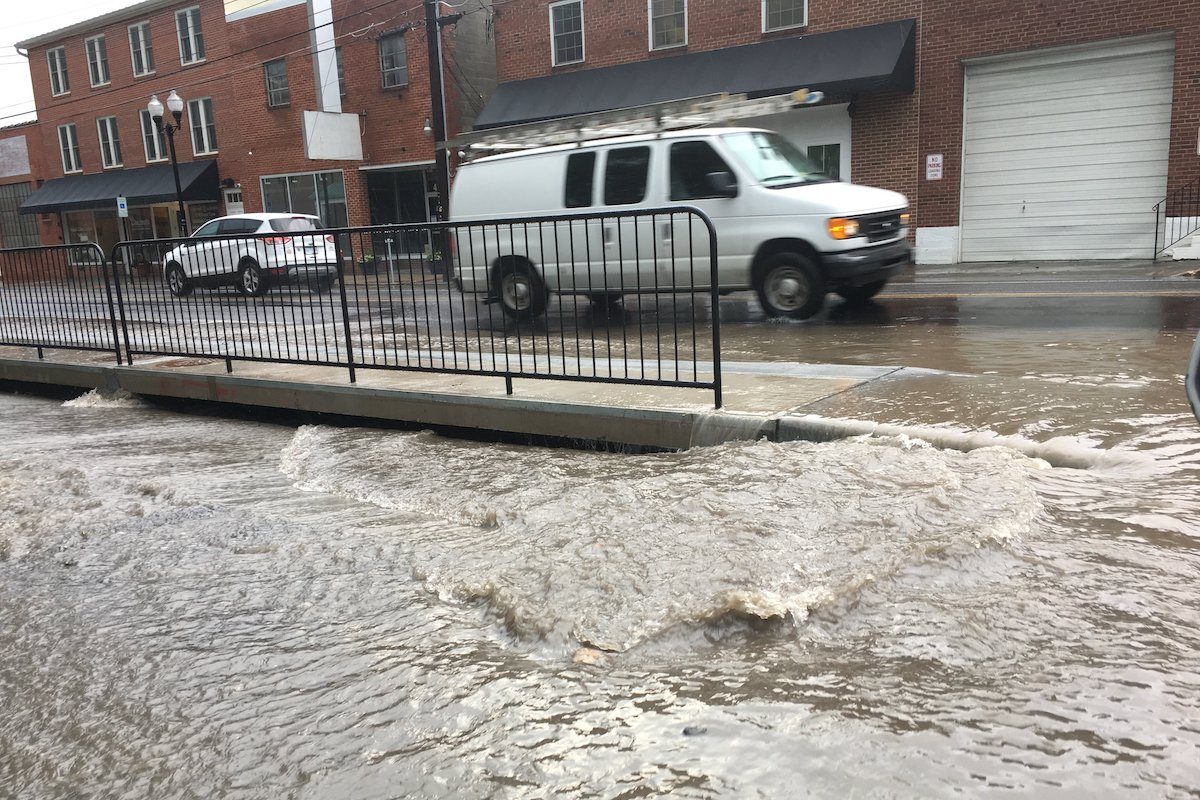Bill of the Day: Statewide Flood Planning
Updated on February 22nd, 2024.

Inland Flooding in the City of Winchester
What are the best ways to address flood risk in Virginia?
Virginians across the Commonwealth are dealing with flood risks firsthand, from rising seas along our coastlines, flash floods in our mountains, and more powerful storms statewide. Flooding is the costliest natural disaster and is increasing in frequency. Virginia has the highest rate of relative sea level rise on the Atlantic Coast while also experiencing an 18% increase in rainfall intensity over the last 20 years. Experts estimate that Virginia needs at least tens of billions of dollars to address flood risk.
The good news is that Virginia’s legislature has taken steps over the past few years to implement programs to address flood resilience. Research shows that for every $1 we put into flood mitigation, we’ll save at least $6 when the next flood strikes. To invest in flood resilience, the Regional Greenhouse Gas Initiative has already raised $372.5 million in revenue for the Community Flood Preparedness Fund (CFPF) for community-scale flood risk reduction planning and projects across the state. To supplement the CFPF, Virginia legislators also established the Resilient Revolving Loan Fund in 2022 to provide loans for local governments to lend to property owners for flood resilience projects.
Although we have new programs to address increasing flood risk, the amount of reliable funding pales relative to the challenges we face and state agencies lack the capacity to leverage and administer additional funding that local communities desperately need. Climate resilience is an interdisciplinary threat that needs collaboration and coordination across multiple state agencies. In 2023, the Administration’s Resilience Coordination Working Group recommended creating the Office of Commonwealth Resilience so that Virginia can successfully receive and distribute flood resilience funds for planning, studies, and projects to reduce community-scale flood risk to localities on the coast to Southwest Virginia.
Take a deeper dive into all the ways that Virginia can address flood resilience in Our Common Agenda by reading the “Advancing Equitable Statewide Flood Planning” policy paper.
Statewide Flood Planning Bills to Support in the General Assembly
Legislators have introduced the following bills to support a flood-resilient Commonwealth:
(Delegate Michael Feggans): Enables the Resilient Revolving Loan Fund to distribute grants and loans to low-income communities. This bill prioritizes getting homes and businesses out of flood plains and restoring the surrounding ecosystem to enhance flood resiliency.
(Delegate Phil Hernandez): Establishes and supports an Office of Commonwealth Resilience and a standalone Chief Resilience Officer appointee. Companion to SB733.
(Delegate Shelly Simonds) Establishes a workgroup to develop plans for wetland protection and restoration. Continued to 2025 in House Rules.
(Delegate Paul Krizek) Allows private property owners in homeowner associations (HOAs) the authority to install managed conservation landscaping and allows HOAs to enforce reasonable restrictions concerning management, design, and aesthetic guidelines for managed conservation landscaping features. Continued to 2025 in General Laws.
(Delegate Alfonso Lopez) Establishes transparency and oversight of key resilience funds. Incorporated into HB1458.
(Delegate Hillary Pugh Kent) Establishes transparency and oversight of key resilience funds by creating an external Advisory Review Committee to complement DCR’s grant application review. Left in House Rules.
(Senator Timmy French) Reduces the Dam Safety Fund match requirements from 50% to 30% to make funds more accessible to private landowners so they can maintain, repair, or safely remove hazardous dam structures that can create flood and water quality issues for their land and the surrounding community. Continued to 2025 in Finance & Appropriations.
(Senator Dave Marsden): Establishes and supports an Office of Commonwealth Resilience and a standalone Chief Resilience Officer appointee. Companion to HB1458. Continued to 2025 in Finance and Appropriations.
DEFEATED: 44 #1h
(Delegate David Bulova) Budget item directs $500k for 3 FTEs for the Office of Commonwealth Resilience in the Governor’s Office as outlined in HB1458. Note: VCN supports funding the Office of Commonwealth Resilience at the higher amount in 44 #1s.
DEFEATED: 44 #1s
(Senator Dave Marsden) Budget item that directs $800k for 6 FTEs for the Office of Commonwealth Resilience in the Governor’s Office as outlined in SB733.
Take Action
We need Senators to pass the flood resilience package this session to prepare our communities, economy, and environment for a more resilient future. Use Environmental Defense Action Fund’s action alert to send a pre-written email to your legislator asking for them to vote “yes” on HB1458!
